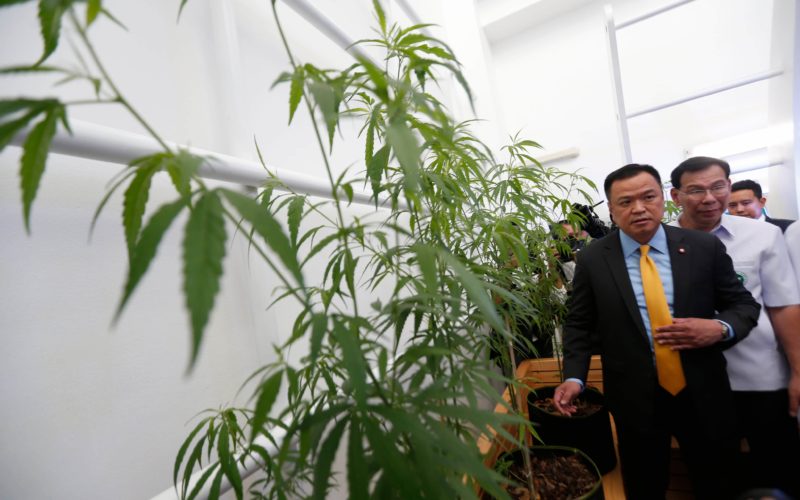Government
Thailand Removes Weed From List of Banned Substances

The Thai government removed cannabis from its list of banned drugs today, making it the first Asian country to decriminalize marijuana.
Thailand removed cannabis from the nation’s list of banned drugs on Thursday, making the country the first Asian nation to decriminalize pot. Government officials warned, however, that the move does not legalize cannabis for recreational purposes.
Under Thailand’s new regulations, marijuana and hemp cultivation and commerce are no longer illegal. Restaurants and cafes will be permitted to sell foods and beverages infused with cannabis, but only if they contain no more than 0.2% THC. Products with higher concentrations of THC are permitted for medicinal purposes.
Boosting Economic Growth
Anutin Charnvirakul, the Thai health minister and deputy prime minister, told CNN before the policy reform was enacted that legalizing cannabis will help foster economic growth and development in Thailand. But he added that the non-medical use of high-THC cannabis is still not allowed under decriminalization.
“It’s a no,” Anutin said, referring to the legalization of recreational cannabis. “We still have regulations under the law that control the consumption, smoking or use of cannabis products in non-productive ways.”
Thailand is retaining strict penalties for the recreational use of cannabis. Under the country’s Public Health Act, smoking cannabis in public can be punished with a fine of about $800 and up to three months in jail.
“We [have always] emphasized using cannabis extractions and raw materials for medical purposes and for health,” Anutin said. “There has never once been a moment that we would think about advocating people to use cannabis in terms of recreation — or use it in a way that it could irritate others.”
The health minister also had a warning for tourists who may believe that Thailand’s new stance on cannabis presents an opportunity to simply enjoy weed. While cannabis tourism for medicinal purposes will be permitted, recreational use is still not allowed, particularly in public places.
“Thailand will promote cannabis policies for medical purposes,” said Anutin. “If [tourists] come for medical treatment or come for health-related products then it’s not an issue but if you think that you want to come to Thailand just because you heard that cannabis or marijuana is legal … [or] come to Thailand to smoke joints freely, that’s wrong. Don’t come. We won’t welcome you if you just come to this country for that purpose.”
Leading the Way on Cannabis Reform in Asia
In 2018, Thailand became the first Southeast Asian nation to legalize cannabis for medical use. Two years later, the Thai cabinet approved amendments to the country’s drug laws to allow for the production and sale of medical marijuana, including cannabis flower. Last month, the Thai government announced that the country would remove cannabis from its list of banned substances and permit the home cultivation of an unlimited number of plants for medical purposes. At the same time, Anutin said that the health and agricultural ministries would collaborate to distribute one million free cannabis plants for residents to grow at home for medicinal purposes.
“This will enable people and the government to generate more than 10 billion baht (nearly $300 million annually) in revenue from marijuana and hemp,” Anutin said after making the announcement. “Meanwhile, people can showcase their cannabis and hemp-related products and wisdom and sell their products nationwide.”
He added that cannabis decriminalization and initiatives such as the distribution of free plants will help fuel the growth and development of agriculture and commerce in Thailand.
“We expect the value of [the cannabis] industry to easily exceed $2 billion dollars,” he told CNN, highlighting recent incentives such as collaborating with the Agriculture Ministry to distribute 1 million free cannabis plants to households across the country. “Thailand, from what I was told, is one of the best places to grow cannabis plants.”
With Thailand’s new policy going into effect, the country planned to release about 3,000 prisoners incarcerated for marijuana or hemp offenses on Thursday. However, law enforcement agencies seem eager to continue the harsh prohibition of the past. Only last week, police in the eastern province of Chonburi arrested a 56-year-old woman for growing one potted cannabis plant, which plainclothes officers had noticed growing in her home through her bedroom window. Her husband later said that the woman has high blood pressure and diabetes so the couple was growing the plant to add to their food. The health minister said that the four officers involved in the case had been reprimanded and disciplined.
“They were given warnings and suspended. They did not obey the law we have just established,” Anutin said. “However, we need to [educate] ordinary people and the law enforcers and let them know how far they can go in terms of using cannabis content … within the legal framework. This is what we have been trying to do, to give as much information as we can to educate people.”
Source: https://hightimes.com/news/thailand-removes-weed-from-list-of-banned-substances/
Business
New Mexico cannabis operator fined, loses license for alleged BioTrack fraud

New Mexico regulators fined a cannabis operator nearly $300,000 and revoked its license after the company allegedly created fake reports in the state’s traceability software.
The New Mexico Cannabis Control Division (CCD) accused marijuana manufacturer and retailer Golden Roots of 11 violations, according to Albuquerque Business First.
Golden Roots operates the The Cannabis Revolution Dispensary.
The majority of the violations are related to the Albuquerque company’s improper use of BioTrack, which has been New Mexico’s track-and-trace vendor since 2015.
The CCD alleges Golden Roots reported marijuana production only two months after it had received its vertically integrated license, according to Albuquerque Business First.
Because cannabis takes longer than two months to be cultivated, the CCD was suspicious of the report.
After inspecting the company’s premises, the CCD alleged Golden Roots reported cultivation, transportation and sales in BioTrack but wasn’t able to provide officers who inspected the site evidence that the operator was cultivating cannabis.
In April, the CCD revoked Golden Roots’ license and issued a $10,000 fine, according to the news outlet.
The company requested a hearing, which the regulator scheduled for Sept. 1.
At the hearing, the CCD testified that the company’s dried-cannabis weights in BioTrack were suspicious because they didn’t seem to accurately reflect how much weight marijuana loses as it dries.
Company employees also poorly accounted for why they were making adjustments in the system of up to 24 pounds of cannabis, making comments such as “bad” or “mistake” in the software, Albuquerque Business First reported.
Golden Roots was fined $298,972.05 – the amount regulators allege the company made selling products that weren’t properly accounted for in BioTrack.
The CCD has been cracking down on cannabis operators accused of selling products procured from out-of-state or not grown legally:
- Regulators alleged in August that Albuquerque dispensary Sawmill Sweet Leaf sold out-of-state products and didn’t have a license for extraction.
- Paradise Exotics Distro lost its license in July after regulators alleged the company sold products made in California.
Golden Roots was the first alleged rulebreaker in New Mexico to be asked to pay a large fine.
Source: https://mjbizdaily.com/new-mexico-cannabis-operator-fined-loses-license-for-alleged-biotrack-fraud/
Business
Marijuana companies suing US attorney general in federal prohibition challenge

Four marijuana companies, including a multistate operator, have filed a lawsuit against U.S. Attorney General Merrick Garland in which they allege the federal MJ prohibition under the Controlled Substances Act is no longer constitutional.
According to the complaint, filed Thursday in U.S. District Court in Massachusetts, retailer Canna Provisions, Treevit delivery service CEO Gyasi Sellers, cultivator Wiseacre Farm and MSO Verano Holdings Corp. are all harmed by “the federal government’s unconstitutional ban on cultivating, manufacturing, distributing, or possessing intrastate marijuana.”
Verano is headquartered in Chicago but has operations in Massachusetts; the other three operators are based in Massachusetts.
The lawsuit seeks a ruling that the “Controlled Substances Act is unconstitutional as applied to the intrastate cultivation, manufacture, possession, and distribution of marijuana pursuant to state law.”
The companies want the case to go before the U.S. Supreme Court.
They hired prominent law firm Boies Schiller Flexner to represent them.
The New York-based firm’s principal is David Boies, whose former clients include Microsoft, former presidential candidate Al Gore and Elizabeth Holmes’ disgraced startup Theranos.
Similar challenges to the federal Controlled Substances Act (CSA) have failed.
One such challenge led to a landmark Supreme Court decision in 2005.
In Gonzalez vs. Raich, the highest court in the United States ruled in a 6-3 decision that the commerce clause of the U.S. Constitution gave Congress the power to outlaw marijuana federally, even though state laws allow the cultivation and sale of cannabis.
In the 18 years since that ruling, 23 states and the District of Columbia have legalized adult-use marijuana and the federal government has allowed a multibillion-dollar cannabis industry to thrive.
Since both Congress and the U.S. Department of Justice, currently headed by Garland, have declined to intervene in state-licensed marijuana markets, the key facts that led to the Supreme Court’s 2005 ruling “no longer apply,” Boies said in a statement Thursday.
“The Supreme Court has since made clear that the federal government lacks the authority to regulate purely intrastate commerce,” Boies said.
“Moreover, the facts on which those precedents are based are no longer true.”
Verano President Darren Weiss said in a statement the company is “prepared to bring this case all the way to the Supreme Court in order to align federal law with how Congress has acted for years.”
While the Biden administration’s push to reschedule marijuana would help solve marijuana operators’ federal tax woes, neither rescheduling nor modest Congressional reforms such as the SAFER Banking Act “solve the fundamental issue,” Weiss added.
“The application of the CSA to lawful state-run cannabis business is an unconstitutional overreach on state sovereignty that has led to decades of harm, failed businesses, lost jobs, and unsafe working conditions.”
Business
Alabama to make another attempt Dec. 1 to award medical cannabis licenses

Alabama regulators are targeting Dec. 1 to award the first batch of medical cannabis business licenses after the agency’s first two attempts were scrapped because of scoring errors and litigation.
The first licenses will be awarded to individual cultivators, delivery providers, processors, dispensaries and state testing labs, according to the Alabama Medical Cannabis Commission (AMCC).
Then, on Dec. 12, the AMCC will award licenses for vertically integrated operations, a designation set primarily for multistate operators.
Licenses are expected to be handed out 28 days after they have been awarded, so MMJ production could begin in early January, according to the Alabama Daily News.
That means MMJ products could be available for patients around early March, an AMCC spokesperson told the media outlet.
Regulators initially awarded 21 business licenses in June, only to void them after applicants alleged inconsistencies with how the applications were scored.
Then, in August, the state awarded 24 different licenses – 19 went to June recipients – only to reverse themselves again and scratch those licenses after spurned applicants filed lawsuits.
A state judge dismissed a lawsuit filed by Chicago-based MSO Verano Holdings Corp., but another lawsuit is pending.
Source: https://mjbizdaily.com/alabama-plans-to-award-medical-cannabis-licenses-dec-1/
-

 Business2 years ago
Business2 years agoPot Odor Does Not Justify Probable Cause for Vehicle Searches, Minnesota Court Affirms
-

 Business2 years ago
Business2 years agoNew Mexico cannabis operator fined, loses license for alleged BioTrack fraud
-

 Business2 years ago
Business2 years agoAlabama to make another attempt Dec. 1 to award medical cannabis licenses
-

 Business2 years ago
Business2 years agoWashington State Pays Out $9.4 Million in Refunds Relating to Drug Convictions
-

 Business2 years ago
Business2 years agoMarijuana companies suing US attorney general in federal prohibition challenge
-

 Business2 years ago
Business2 years agoLegal Marijuana Handed A Nothing Burger From NY State
-

 Business2 years ago
Business2 years agoCan Cannabis Help Seasonal Depression
-

 Blogs2 years ago
Blogs2 years agoCannabis Art Is Flourishing On Etsy













